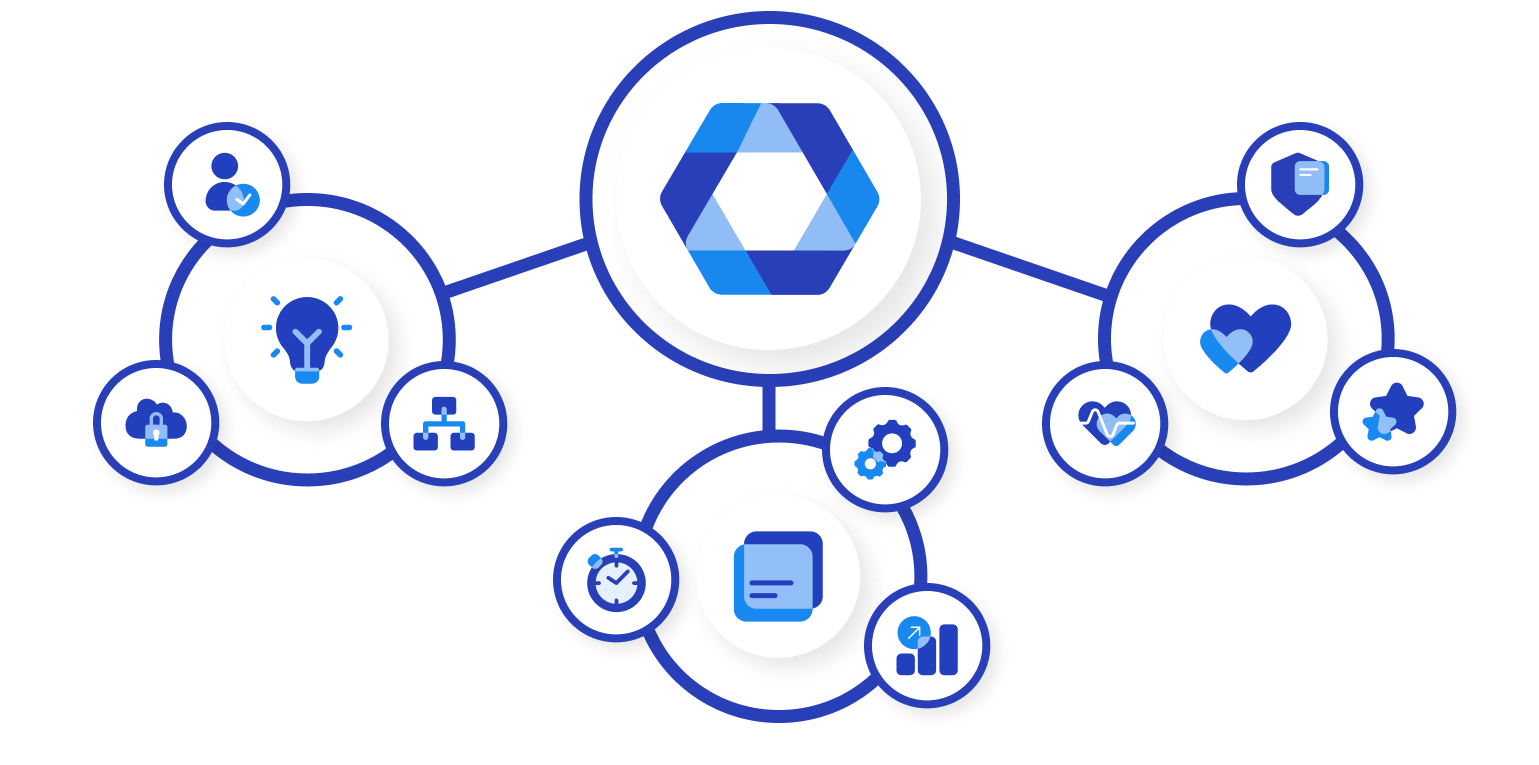In the age of digital healthcare, the impact of artificial intelligence (AI) in elevating care standards and advancing science is profound. One of the areas where AI is making a significant impact is surgery.
As we look toward an exciting horizon, the pivotal role of AI in surgery can’t be underestimated. This fusion can redefine healthcare by delivering outstanding results and enhancing operational efficiency.
What Is AI in Surgery?
AI in surgery refers to the use of AI technologies to improve surgical methodologies, from preoperative planning and intraoperative guidance to postoperative care. By harnessing AI’s ability to analyze, predict, and automate, we can significantly improve surgical procedures.
Current Applications of AI in Surgery
AI is transforming how surgical procedures are conducted, ensuring better accuracy, efficiency, and patient outcomes.
Preoperative Planning
AI has dramatically simplified the preoperative planning phase. It’s advanced algorithms and machine learning capabilities have made it possible to predict surgery outcomes, personalize treatment plans, and assist surgeons in their preparations, leading to increased patient safety and improved surgical outcomes.
AI in Preoperative Planning
AI systems are instrumental in pre-surgery planning. Through the analysis of a patient’s medical records, imaging results, and genetic information, AI can help make tailored surgical plans. It can predict complications and help surgeons select the best surgical method, making surgery safer and more efficient.
AI in Analysis of Patient Data
AI can analyze huge amounts of patient data quickly and accurately, including their lifestyle, previous medical conditions, genetic markers, and past treatment responses.
This analysis can help identify potential risks, predict complications, and provide valuable insights into surgery outcomes, enabling doctors to make the best surgical decisions to enhance patient outcomes.
AI During Surgeons’ Preparations for Surgery
AI’s role extends to assisting surgeons in preparing for surgery. It can provide detailed analytics such as expected blood loss, estimated surgery time, and potential challenges during surgery. These insights help surgeons prepare for an operation more effectively, leading to better surgical accuracy, reduced operation time, and improved chances of successful outcomes.
Using AI, surgeons can visualize the surgery beforehand, understand the patient’s unique anatomy, and anticipate potential problems. This not only makes the surgeon more prepared but also reduces anxiety and boosts confidence by providing a clear plan for the upcoming procedure.
Intraoperative Guidance
During a surgical operation, time and precision are paramount. AI helps in surgery by offering real-time guidance, predicting surgical outcomes, and automating simple tasks, making surgeries more accurate and safer.
Real-Time Guidance
AI tools can provide real-time guidance during surgery by analyzing vital signs, imaging data, or even the surgeon’s movements. They help surgeons make valuable on-the-spot adjustments, which can significantly reduce procedural errors and improve patient outcomes.
Predictive Analytics
In surgery, foreseeing complications can be lifesaving. AI can anticipate potential complications during an operation by learning from vast datasets on surgical results.
It can alert the surgical team about possible issues like unexpected bleeding or changes in vital signs so they can intervene promptly. This can greatly enhance patient safety and lower the risk of unforeseen complications.
Simple Tasks Execution for Surgical Precision
Surgical procedures often involve several simple but critical tasks, such as suturing or handling tissue. AI can automate these tasks accurately and consistently, freeing up surgeons to concentrate on more complex parts of the operation.
Furthermore, AI-driven robotic arms can do these tasks more precisely than humans. This not only improves surgical accuracy but also makes the operating room smarter and more efficient and promotes better patient outcomes.
Postoperative Care
Postoperative care is critical to patient recovery and continues long after the procedure. AI can offer substantial support in this phase by closely monitoring patient recovery, anticipating potential problems, and personalizing care plans to suit individual needs.
Monitoring Patient Recovery
AI systems can monitor a patient’s recovery in real-time, checking their vital signs, healing progress, and response to treatment. They can detect slight changes in the patient’s health and alert caregivers. Moreover, they can flag potential complications, which can be beneficial in ensuring a fast response and preventing deterioration in the patient’s condition.
Predicting Potential Adverse Events
AI has a significant role in managing risks after surgery. By analyzing vast volumes of patient data and learning from past cases, it can predict potential adverse events such as infections, readmissions, or delayed recovery.
This allows doctors to act in advance, administer appropriate interventions, or adjust care plans as needed, significantly improving patient safety and aiding in a faster recovery.
Personalizing Postoperative Care
Just as every patient is unique, so should their postoperative care plans. AI uses individual patient data, including medical history, lifestyle, genetics, and surgical outcomes, to create personalized care plans after surgery.
These include tailored pain management strategies, rehabilitation exercises, dietary plans, and follow-up schedules. This personalization improves the recovery process and patient satisfaction. It shows the huge potential of AI in transforming healthcare.
Role of AI in Surgical Robotics
Surgical robotics is another niche where AI is breaking traditional barriers.
AI-Assisted Robotic Surgery
AI-assisted robotic surgery is a groundbreaking development that offers superior precision, improved visibility, and increased efficiency, paving the way for an exciting future for surgery.
Robotic Laparoscopy
Laparoscopic surgical robots have transformed minimally invasive surgeries. These devices give surgeons a high-resolution, three-dimensional view of the surgical site. This magnified view, combined with AI’s ability to learn from previous operations, allows for more precise procedures with less tissue damage, pain, and blood loss and shorter hospital stays.
Robotic Cardiac Surgery
AI is pivotal in robotic cardiac surgeries by making them more precise and less invasive. It guides surgical robots to perform complex heart procedures accurately and predicts potential complications, making surgeries safer and less traumatic for patients and reducing recovery times.
Robotic Scrub Nurse
In the operating room, AI-powered robotic scrub nurses are becoming instrumental in ensuring efficiency.
These autonomous robots can identify and provide the correct surgical instruments at the right time, reducing the time surgeons spend searching for instruments and allowing them to focus more on the operation. By learning from each surgery, these robots improve over time, providing even more efficient service in future surgeries.
Benefits of AI Robotic Surgery
Integrating AI in surgical robotics opens up many opportunities, from staying updated with new trends to redefining surgical care and learning from expansive data sets.
Recognizing New Trends
Staying updated with the latest trends is imperative in the rapidly changing medical field. AI robotic surgery systems can analyze large amounts of data from various surgeries to identify new trends and effective strategies. This helps surgeons refine their techniques and improve patient outcomes.
Redefining Surgical Care
AI is redefining surgical care by providing surgeons with unmatched precision and consistency. AI-powered robots can perform complex procedures and operate in hard-to-reach areas with a precision that may be challenging for humans, improving surgical success rates.
Learning from Large Data Sets
One of the major benefits of AI is its ability to learn from large data sets. With every surgery, AI systems gather and analyze data to refine their algorithms. This allows them to predict potential complications, suggest optimal surgical approaches, and guide surgeons, significantly improving the quality of care.
How AI Is Transforming Medical Education and Training
Beyond enhancing surgical procedures, AI is also a powerful learning tool. It supplements limited teaching resources and provides interactive, real-time insights.
AI-powered tools help mimic complex, risky surgical procedures. Since surgery leaves no room for trial and error, these simulations provide a risk-free environment for trainees to practice without fear of causing harm. These can be repeated as many times as needed, allowing students to learn at their own pace and gain confidence.
In addition, AI can provide real-time feedback that highlights strengths and weaknesses and suggest personalized learning paths. This personalized approach to training encourages proficient surgeons prepared for the demands of modern surgical procedures.
By bridging the gap between theoretical knowledge and practical skills, AI not only improves training but also shapes the future generation of surgeons. As AI evolves, so will its role in medical education and training, opening new doors to learning and proficiency in surgical care.
Challenges in Implementing AI in Surgical Procedures
The transition to AI-integrated surgical procedures is filled with challenges. These include trust issues, accountability, data bias concerns, patient privacy, and data-sharing protocols. As a result, there’s a pressing need for robust policies and guidelines to ensure the safe, ethical, and effective use of AI in surgery.
Trust Issues
Despite its impressive capabilities, AI is still relatively new in the medical field. As with any new technology, it takes time for healthcare professionals and patients to trust its reliability. Developing this trust requires time, proven success, and a strong understanding of how AI operates in surgical procedures.
Accountability
In surgical errors involving AI, accountability becomes a complex issue. Determining whether it’s the fault of the AI algorithm, surgical team, or AI developers is a gray area that needs addressing. Clear regulations are needed to handle such situations.
Data Bias
AI’s decisions are only as good as the data it’s trained on. Biased or incomplete data could lead to inaccurate or harmful recommendations. Ensuring that AI systems are trained on comprehensive, unbiased data is critical for their effective use in surgery.
Patient Privacy
AI systems rely on extensive patient data to operate effectively, which raises privacy concerns. Protecting this data and ensuring it’s used ethically and responsibly is of utmost importance. The challenge is finding a balance between leveraging data for AI and respecting patient privacy.
Data Sharing
For AI to be effective, data sharing between different healthcare providers is beneficial. However, this often faces resistance because of competition and privacy concerns. Open dialogue and clear data-sharing policies can help overcome these challenges while ensuring the secure and ethical use of patient data.
Predicting the Future of Surgical Innovations
The intersection of AI and surgery is set to redefine the surgical landscape, changing how medical procedures are done. As we think about the future of surgical innovations, three key trends underscored by AI promise a transformative impact.
Better Operative Planning
Using data analysis and pattern recognition, AI can develop more detailed and accurate operative plans. It can predict potential complications and suggest the best surgical methods, leading to more successful surgeries and better patient outcomes.
This new age of operative planning is not only more data-driven but also more personalized, considering the unique needs of each patient.
Avoiding Intraoperative Complications
Intraoperative complications can be a significant risk to patient safety and can compromise the success of surgeries. Through its real-time guidance and predictive abilities, AI can significantly reduce these complications. It can provide alerts about potential risks and guide the surgery, making it safer and more efficient.
Enhanced Post-Operative Recovery Rates
AI is expected to play a more significant role in post-operative care by improving recovery rates. It can constantly monitor patient health, predict potential problems, and personalize care plans. This comprehensive and attentive care during recovery can reduce readmission rates, speed up recovery, and improve the overall patient experience.
As technology continues to advance, AI’s impact on surgical innovations will only grow, leading us into an exciting future of healthcare where surgeries are safer, outcomes are better, and patient care is truly personalized.
Embracing AI in Surgery
AI offers a huge potential in surgery, offering possibilities that were unthinkable only a few years ago. From preoperative planning to postoperative care, it improves every step of the surgical process. It makes surgeries safer and more precise, shortens recovery time, and, ultimately, can save more lives.
However, integrating AI into surgery isn’t without hurdles. Issues around trust, data privacy, and data sharing between different healthcare providers must be addressed. Rigorous research, ethical guidelines, and robust protocols are needed to use AI safely and effectively.
Furthermore, to maximize the potential of AI in surgery, everyone needs to work together, including surgeons, data scientists, healthcare administrators, and policymakers. They need to overcome the challenges together to fully integrate AI into the healthcare system.
Using AI in surgery means embracing change and learning new skills. Though this might seem daunting, with the right mindset and tools, it’s an exciting journey.
If you’re ready to explore how AI can transform your surgical practices, Kizen is here to support your journey. Let’s work together to create a healthier and safer future for patients. Contact us today to learn more about our AI solutions tailored for healthcare.











